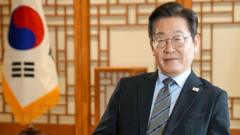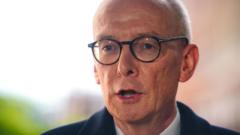Could a Trump-Kim Deal Freeze North Korea's Nuclear Program?

Published: 2025-09-21 21:15:15 | Category: technology
South Korea's President Lee Jae Myung has expressed willingness to accept a temporary agreement that would see North Korea freeze its nuclear weapons production, rather than eliminate them outright. This approach is seen as a pragmatic step towards stabilising tensions on the Korean Peninsula, given North Korea's commitment to its nuclear arsenal since declaring itself a nuclear power in 2022.
Last updated: 10 October 2023 (BST)
Key Takeaways
- President Lee supports a freeze on North Korea's nuclear production as an interim measure.
- Previous denuclearisation talks have failed, with North Korea rejecting recent negotiations.
- Lee emphasises the importance of restoring trust between North and South Korea.
- Chinese and Russian support for North Korea complicates South Korea's diplomatic position.
- Lee is navigating a polarised domestic political landscape while seeking peace with the North.
Context of the Nuclear Discussions
President Lee Jae Myung, who took office in June 2023, is grappling with complex dynamics surrounding North Korea's nuclear ambitions. He recently indicated a readiness to accept a deal between former US President Donald Trump and North Korean leader Kim Jong Un that would involve a halt to North Korea's nuclear weapons production. This shift is significant, considering North Korea's consistent refusal to discuss denuclearisation in previous negotiations.
In 2022, North Korea declared itself a nuclear state, vowing never to relinquish its arsenal. Reports suggest the regime is producing an estimated 15 to 20 nuclear weapons annually, underscoring the urgency of diplomatic efforts to freeze these activities. Lee described the proposed freeze as "an interim emergency measure," aimed at stabilising the situation while keeping the long-term goal of denuclearisation in sight.
Challenges in Diplomatic Relations
Despite Lee's optimistic outlook, past attempts to negotiate with Pyongyang have largely faltered. North Korea has consistently rejected invitations to return to talks, maintaining a hardline stance against any conditions that threaten its nuclear capabilities. The South Korean president acknowledged this reality, stating, "The question is whether we persist with fruitless attempts towards the ultimate goal [of denuclearisation] or we set more realistic goals and achieve some of them."
Lee's approach marks a departure from that of his predecessor, Yoon Suk Yeol, whose aggressive stance towards North Korea led to heightened tensions. Under Yoon, South Korea saw attempts to impose martial law, which ultimately resulted in his impeachment. In contrast, Lee is committed to fostering a more peaceful relationship with the North.
International Dynamics and Regional Security
The geopolitical landscape is further complicated by the growing alliance between North Korea, China, and Russia, particularly following a recent military parade in Beijing attended by Kim Jong Un and Russian President Vladimir Putin. This evolving relationship poses a significant challenge for South Korea, as Lee noted: "Seeing China, Russia and North Korea become so close is clearly not desirable for us."
Lee has indicated a desire to strengthen ties with the United States and Japan in response to these developments. Historically, South Korea has balanced its relationships with both the US and China, but the current geopolitical climate makes this balance more precarious. "The world is dividing into two camps," he remarked, highlighting South Korea's "truly precarious location" adjacent to these major powers.
Internal Political Landscape
Lee's presidency comes at a time of significant political upheaval in South Korea, following months of turmoil stemming from Yoon's controversial policies. The previous administration's failure to manage relations with North Korea has left a legacy of mistrust and division within the country. Lee has begun to implement measures aimed at rebuilding this trust, including halting government broadcasts into North Korea, which had previously been a source of tension.
Critics, including human rights organisations, have expressed concern over this decision, arguing that such broadcasts were a vital link to the outside world for North Korean citizens. Lee, however, defended the move as necessary to avoid antagonising the North and to create an environment conducive to dialogue: "We think these measures will help get North Korea to return to talks."
Future Prospects for Peace
Despite North Korea's dismissive response to his overtures, Lee remains pragmatic about the need for dialogue. He acknowledges that the nuclear weapons issue cannot be resolved overnight, stating that North Korea's nuclear arsenal is unlikely to be negotiated away entirely in the near future. Nonetheless, he believes that establishing a framework for dialogue is essential for progress.
Lee's administration aims to use the situation to strengthen relationships with the US, particularly following a recent incident involving the detention of Korean workers in the US. This episode, which raised concerns about the treatment of South Korean citizens abroad, could serve as a catalyst for deeper cooperation between the two nations. "There's a Korean proverb that says, 'after the rain, the ground hardens'," Lee remarked, conveying his hope that challenges can lead to stronger ties.
Conclusion
As President Lee Jae Myung navigates the intricate dynamics of North-South relations, his willingness to consider a nuclear freeze underscores a pragmatic approach towards peace. While the road ahead remains fraught with challenges, including North Korea's unwavering commitment to its nuclear programme and the complexities of international alliances, Lee's presidency offers a potential path toward reducing tensions and fostering dialogue. The question remains: can a temporary agreement lead to lasting peace on the Korean Peninsula?
#NorthKorea #SouthKorea #NuclearDiplomacy
FAQs
What is South Korea's current stance on North Korea's nuclear weapons?
South Korea, under President Lee Jae Myung, is open to a temporary agreement to freeze North Korea's nuclear weapons production while pursuing long-term denuclearisation goals.
What did North Korea declare in 2022?
In 2022, North Korea declared itself a nuclear power and vowed never to relinquish its nuclear arsenal, complicating diplomatic efforts for denuclearisation.
What impact does China and Russia's relationship with North Korea have on South Korea?
The growing ties between China, Russia, and North Korea create a challenging diplomatic environment for South Korea, as it seeks to maintain security and cooperation with the US and Japan.
How has President Lee's approach differed from his predecessor?
President Lee Jae Myung's approach is more conciliatory towards North Korea compared to his predecessor, Yoon Suk Yeol, who adopted a more aggressive stance that resulted in heightened tensions.
Are there any recent incidents affecting South Korea's relationship with the US?
Yes, a recent incident involving the detention of Korean workers in the US has raised concerns, but President Lee aims to use this situation to strengthen ties with Washington.



